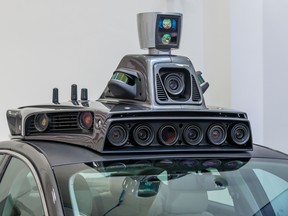Will drivers realize we lost our privacy when it's too late?
Autonomous this, wireless that – it sounds great until you consider how much of your personal information is being stored, and possibly shared

Article content
If I want to fly under the radar as I drive my car, I can leave my cellphone at home, stay off the toll highway, keep out of urban areas with their I Spy Everything cameras and go about my nefarious business. Unless I crash or cause 6 o’clock newsworthy mayhem, chances are nobody will care what I do.
Plunk me in an autonomous car, and suddenly I’m driving around leaving cookies all over the place. And not the good kind. No thanks.
You can buy medic alert bracelets that say, “Delete my browser history.” Sure it’s a joke, but it’s not. Our cars are already essentially computers with tires; they’ve also been capable of sending information to other places – the manufacturer, insurance companies – for years. The advent of global positioning systems (GPS) created ethereal strings to satellites, even when the information was garbled and plunged people into the sea.
Technology is so fast, so amazing and so damned fun that people forget we’ve become the frog in the pot: The water is heating up so gradually we all think we’re enjoying a day at the spa instead of being cooked to death in our own bigger, better, faster, gotta have it, watch me! watch this! FOLO, YOLO pot. We’re running full tilt off a cliff where, using our last gasp of air, we pull the cord on our parachute emblazoned with the word “privacy,” which turns out instead to just be a Hello Kitty backpack.
Don’t tell me if I have nothing to hide, I have nothing to fear. I have never seen an argument that so weakly grasps the importance of handing over information. And you are being worked, trust me. I recently had to amend my car insurance policy and, as I picked and parsed over limits and deductibles and coverages, I was asked if I’d like to save 20 per cent on my rates, and the spiel began about monitoring systems. It took me over a minute to realize what she was getting at, so good was the spin. I research and write about this all the time, and I was still getting an end run.
I’ve written about these trackers that insurance companies began offering up to clients several years ago in the U.S. It’s an insidious case of Big Brother oversight that millions are happily signing up for because they have nothing to fear, of course. What do they care if an insurance company knows they never do hard stops, never break the speed limit and never drive in the dark? Looks like a great deal as they tell you there is no downside: Obey their guidelines and get a discount; disobey and it’s a wash because they will not penalize you.
Sure.
Michael Froomkin is a law professor at the University of Miami who specializes in privacy, the internet and robotics. As we see the rapid merging of telemetry and automation, I asked how much I can rely on the assurances that my information won’t be folded or twisted.
“Nobody who understands this can give those assurances,” he says. “The whole point is to find unpredictable correlations, to find what we didn’t know was there.” He notes there is a difference between the traditional black box model, where information can be pulled after the fact, and the telemetry model that is always on, always transmitting. “With the right to resell, all this data is warehoused and mined.” He mentions manufacturers, banks and insurance companies as first in line for such information.
Anyone in the business of making money is in the business of protecting their ability to make money. Insurance companies and car manufacturers and things like Uber and Lyft are in the business of making money. What happens to my information? They assure me they won’t sell it or use it against me. I do not believe them, just like I don’t believe Facebook and Google. The difference is that I presume internet companies are tracking my movements and leading me to shoe stores, but I do not want my car manufacturer or insurance company marketing private information based on my movements.
As more and more cheer the coming of full autonomy, I definitely applaud the safety implications of removing the human factor; we cause the crashes. But let’s say I have a whole roster of medical appointments that are my business only. All that information – locations, appointments – is now sitting on a car manufacturer’s, car-for-hire or insurance company’s server. Which big corporate entity gets to trade notes with another and decide I no longer qualify for benefits where I work? Who could twist the fact I go to the wine store three times a day to their benefit? What jobs will I not even get based on this information that has been retrieved by entities I can’t even predict?
When insurance companies originally pitched their “get a discount, give up nothing” trackers, I immediately asked an insurer insider how long until that information would be used against customers. I was told it won’t be. Yet.
Frog, pot.












Postmedia is committed to maintaining a lively but civil forum for discussion. Please keep comments relevant and respectful. Comments may take up to an hour to appear on the site. You will receive an email if there is a reply to your comment, an update to a thread you follow or if a user you follow comments. Visit our Community Guidelines for more information.